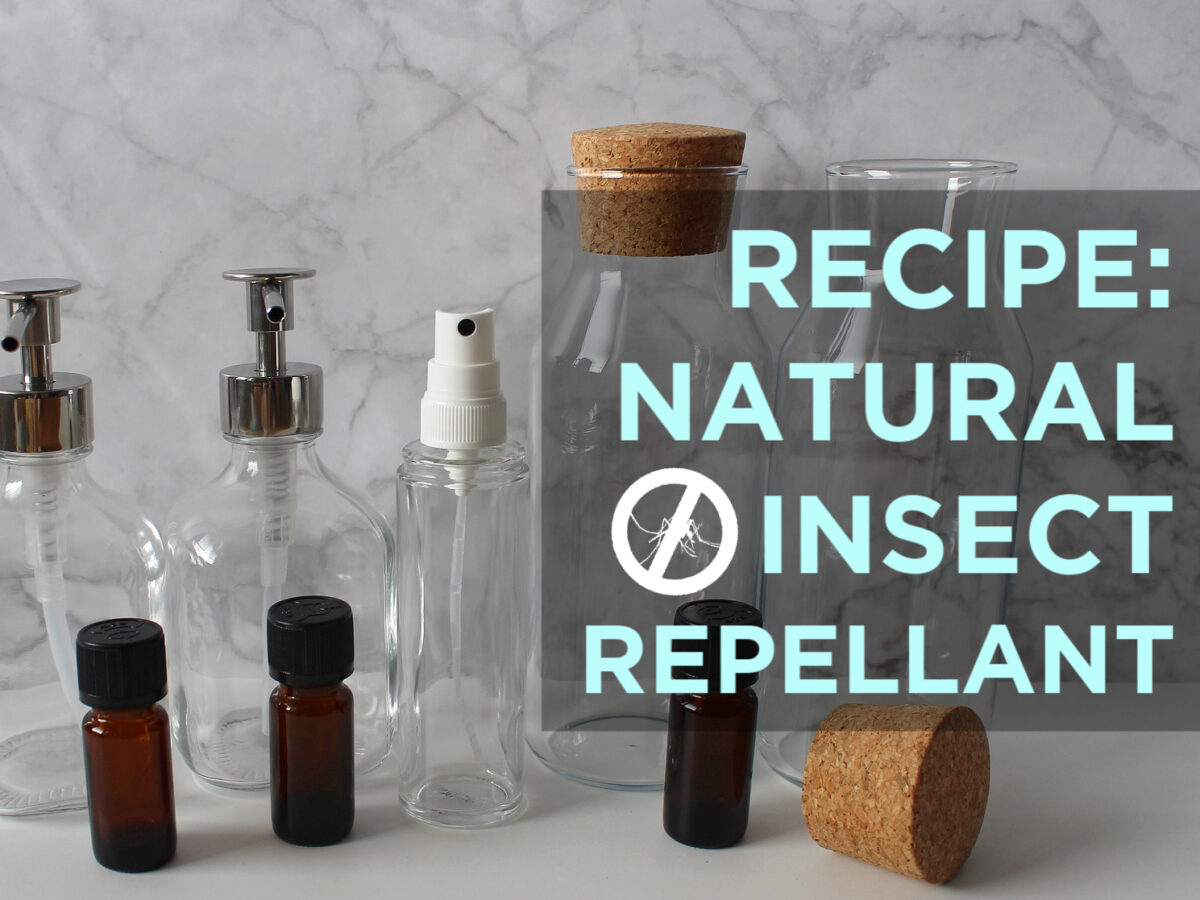YIPPIIIIIIEH!!! Winter is gone – at least according to the calendar – Spring is here! Longer days, more sunshine, temperatures rising, flowers blooming and.. insects buzzing!
Sure, I will always let bees do their job – but mosquitos (family: culicidae) and bugs are likely to turn me into a serial killer! My blood must be the sweetest nectar for these little creatures – if you are with me, chances you get bitten go down to zero – while there is a blood fest happening over on my skin.
Therefore, the research for natural insect repellants and mosquito sprays is 100% in my own interest 🙂 The first part is about bugs in general, the second part goes a bit into detail about one special friend.
NATURAL MOSQUITO PROTECTION & INSECT REPELLENTS THAT WORK FOR ME:
 EARLY PREVENTION:
EARLY PREVENTION:
Bugs are attracted to scent and if you still have some time before your trip to mozzie-country or it is only early in the season, start taking Vitamin B6. Mosquitos to not like to smell and will avoid you. Plant foods rich in Vitamin B6 are sweet potato, potato, sunflower seeds, spinach and bananas but for this venture, opt for supplements from your organic store or get them here (use code HJP522 upon checkout for 10$ off your first order).
Drinking Apple Cider Vinegar apparently does the trick as well, for the same reason that bugs do not like the smell. Either use it in your salad dressing or simply down 1 TBSP every morning – this would also double up as a cleanser for your internal system. ACV is great!
TIMING:
Generally speaking, bugs have a great life. They sleep right into mid-day siesta and will only come out for sunset. They kind of have their own happy hour 🙂 Thenthey are drunk ’til dawn which is when they come out for a refill. And then they rest again to recover .. until sunset. So it makes sense to avoid being out during sunrise and sunset. Or .. just hang out with me.
WATER:
Bugs like it humid – many, including mosquitos breed in standing water and lay their eggs there. So if you have standing water, such as flower pots, empty it. For water such as rainwater collectors or ponds, obviously do not empty them but see if you can cover it – with a fine mesh net for example – to shield yourself, or move your outdoor furniture away if it is right next to the water source. Or.. just invite me over.
CLOTHING:
Cover your body. Wear loose clothes with long sleeves / pants. That’s airy in a hot climate and will prevent a LOT of mozzie bites. If you are in a completely infested area, wear a hat with a net all around, like a bee keeper. Might look weird but really helps. Also, wear light colours. Bugs like dark coloured clothing. Wear light coloured clothes, also light coloured socks – just pretend you are channeling Michael Jackson.
PLANTS THAT REPEL INSECTS:
Bugs are madly attracted to some scents, but hate others. Take advantage of that and plant one or more of the following in your garden, on your balcony or place flower pots in front of your windows – with the bonus possibility of a little herbal garden:
Basil
Catnip
Chives
Geranium flowers
Lavender
Lemon balm
Marigold (tagetes)
Olibanum
Peppermint
Ribwort (plantago lanceolata)
Rosemary
Tomatoes
Walnut tree
(such a pot plant is also a really nice and thoughtful gift for house warming parties, maybe in combination with the next one – a home made mozzie spray!)
SCENTS:
Do not bother with perfume, skip fabric softeners and reduce hair spray to a minimum as bugs will be attracted to the scent. Instead get a natural repellant such as this one or spray with a home made one:
NATURAL DIY INSECT REPELLANT SPRAY RECIPE
You will need:
- a small, empty spray bottle – get travel sized ones in your drug store.
- 1/2 Cup clean water, ideally distilled (boil filtered water, cool to room temperature) OR oil such as sweet almond or coconut oil
- 1 TBSP pure alcohol or vodka
- around 8 drops (depending on strength) of essential oils – use just one or create your own, personal blend out of the following:
Cedar (cedrus atlantics)
Citronella (cymbopogon nardus)
Clove (eugenia caryophyllata)
Eucalyptus (eucalptus globulus)
Geranium (pelargonium graveolens)
Lavender (lavandula officinalis)
Lemon (citris medica limonum)
Lemongrass (cymbopogon schoenanthus)
Peppermint (mentha piperita)
Rosemary (rosmarinus officinalis)
Tea Tree (melaleuca alternifolia)
Directions:
Pour alcohol into the spray bottle. Add your choice of essential oils. Swish around. Add water or oils but leave a bit of space so you can shake the bottle before using it.
If using oil (as opposed to water), I would not fill a spray bottle because they tend to clog, but just a normal dispenser bottle instead.
For a family-sized bottle, simply double the ingredients.
How to use:
Shake and spray 🙂 Avoid eyes please! Instead, spray into your palm and pat your neck and behind ears, that should do. Reapply as needed – more often if you sweat and of course after swimming.
TOO LATE?
Daisies and lemon balm help to soothe the itch. Simply pick a leaf, squash it between your fingers and rub the juice onto the itch. Another option is to press hot metal against it, such as a key that had been lying in the sun or a hot spoon (after stirring hot water). You could also dab a towel in hot water and press it onto the bite. The heat will change and dissolve the chemical structure of the protein in the mosquito’s poison and the itch will fade.
PART TWO: SANDFLIES – MY SPECIAL FRIENDS
(you have my eternal respect if you manage to not get bitten or to not scratch a single bite)
What are sandflies?
Sandflies are also known as midges or blackflies. They are bugs so tiny you barely see them. Rumour has it they don’t really bite you but actually pee on you which apparently is a myth. Whatever they do, it burns and itches like crazy. If you scratch, you rub it in and the itch will last for days. Skin irritations can be mild and invisible, or red and even blistery.
Where do sandflies live?
Sandflies like swampy areas, mangrove, bush and flowing water such as beaches, rivers or lakes. They have great taste in location – they hang out in the Bahamas, Belize, Cuba or New Zealand and I have had the “pleasure” of meeting them in the Caribbean in Honduras and in Australia.
One good thing: They do not hang out indoors and also stay close to the ground because they cannot fly high or far so if you are above ground level, you will be fine.
Before – how to prevent sandfly bites:
If you have a few months before your trip (or sandfly season, take Vitamin B6. Sandflies do not like the smell and will avoid you.
If you are already in sandfly territory/season: The standard recommendation here is the chemical DEET, a chemical with can have scary side effects.
Lemon Eucalyptus Oil extract (Corymbia citriodora, but not simply essential oil) and Tea Tree Oil are a more natural options and lemon eucalyptus has been shown to be just as effective.
Because sandflies are so tiny, coating your skin with oil can help as well, and the buggers won’t be able to get through to your skin. Ideally, blend coconut oil with lemon eucalyptus and tea tree!
After – how to survive a sandfly attack:
Do. Not. Scratch. Really, DON’T. Scratching will not only let the itch continue for days, but your skin will be damaged – in combination with salt water, it takes forever to heal – I am talking months here – and you will be left with a scar. Instead of scratching,rinse with cool water(do not jump in a hot shower), or use wet wipes Lavender Oil will soothe the burn within a few minutes or put on soothing Aloe Vera Gel. You could also make your own aloe-lavender blend.
Finally: Always ask locals. They know best what works with the critters around and will suggest all kinds of things from wearing silk stockings to rubbing fresh lime juice on bites (it works).






